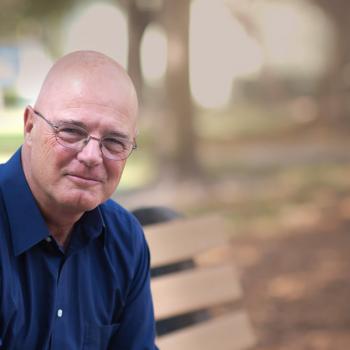 Recently, Patheos hosted an interfaith roundtable on my new book, Why Did Jesus, Moses, the Buddha, and Mohammed Cross the Road? and invited a half dozen bloggers to respond from their own faith perspectives. The following are my responses to each of the contributors, and a link to each blogger’s full post from the roundtable.
Recently, Patheos hosted an interfaith roundtable on my new book, Why Did Jesus, Moses, the Buddha, and Mohammed Cross the Road? and invited a half dozen bloggers to respond from their own faith perspectives. The following are my responses to each of the contributors, and a link to each blogger’s full post from the roundtable.
Greetings, Brad – thanks for your thoughtful and encouraging reply. I really like the image of walking a journey together – but each in our own shoes. That captures the “difference without hostility” or “strong identity with strong benevolence” that I was trying to convey from first page to last.
Also – I fully agree with you about the danger of claiming to “own the core” and the danger of comparing “our best” to “their worst.” Well said. The core is always a matter of interpretation, and we can always find a range of examples – from best to worst – among every “us” and “them,” and none of us can always claim to be among the best. It’s no wonder that humility is such an essential virtue.
Your point about Jesus being a “divider and disrupter” – especially in relation to the priests and Pharisees – is also a good and important one. There is no way to stand for something without also needing to stand against other things, but as your book (which I want to read!) says, there are ways to be faithful without being fanatical, and ways to differ and perhaps even disrupt without being hostile.
In the future, I want to spend more time looking at Jesus as “divider and disrupter,” thanks to your insight. There’s always more to learn! Again – thanks for your input.
+++++
Greetings, Scott – I happen to be just down the road from Graduate Theological Union as I write these words, and I wish my schedule would allow me to stop by and visit. What you describe as being normative there – where each can share their particular spiritual experience “free from fear of the other” – is still too rare in many places in our world. It sounds like a taste of how things should be.
Regarding your push-back on my chapter about the Holy Spirit – be assured, I wouldn’t say what you thought I was saying. I would not want to render the Buddha’s experience a Christian experience, or equivocate nirvana with the Holy Spirit. Like you, I am not a big fan of the “many paths up one mountain” metaphor – or of its close cousin, the “blind men and the elephant” metaphor.
I agree more – as I think you would – with what Christian theologian John Cobb has called the (potential, at least) “incommensurability” of religions.” In other words, Christians and Buddhists may be climbing different mountains. We might not be saying different things about the same thing, or the same thing in different terms – we may, at various points, be talking about different things entirely. One blind man may be feeling the legs of a giraffe, another may be touching the trunk of an elephant, and another may be handling a python – not describing different facets of one elephant. It might be arrogance, it might be ignorance, or it might be naivete that would make us assume that what the blind men are touching is the same thing. To extend the metaphor, it’s important to remember that we who make the assessment are as blind as they!
As you say, Jesus and the Buddha need to be understood on their own terms. Thanks for affirming that important point.
+++++
Greetings, Aziz – An “engineer monk” – a new category for me, and one I like. Thanks, Aziz!
Thanks also for the link to Rick Warren’s 2009 ISNA speech. I remember hearing about it back in 2009, but had since forgotten about it – thanks so much for pointing me to the whole transcript.
You’re right: I think Rick’s speech beautifully captures the kind of “strong and benevolent” Christian identity I was arguing for in the book. In fact, what Rick emphasizes – not just talk, but action for the common good – really summarizes the final section of my book where I talk about “the Missional Challenge.” I wish I would have quoted and footnoted it in the book because it really does exemplify what I think we need so much more of. (Way to go, Rick Warren!)
You’re right – that I am trying to combine aspects of Warren’s and Kreeft’s approaches. The decoupling of “hostility and strength” is essential for all our faith traditions, I believe.
You speak of the double-bind tension we all feel at times – of being offended when the Prophet of Islam is insulted, yet also defending freedom of speech. Silence would be unacceptable; so would vicious speech that returns insult for insult. I think you modeled exactly the needed response: to use your own freedom of speech – with grace and intelligence – to respond to foolish and ungracious free speech from others.
Thanks for your wise insights, Aziz!
+++++
Greetings, Padma – I’m so glad you found some valuable insights from my book, and equally glad that it raised worthwhile questions for you. All the specific examples you gave reveal a careful and thoughtful reader!
The issue of pluralism and proselytization is so important. You ask, “What about freedom from pressure to change one’s religion? What about the freedom to retain one’s religion?” I imagine this is very hard for Hindu people to understand, but some of us Christians are raised in a context where for us not to pressure others to change religions is seen as unfaithfulness to our own. That’s very much the perspective in which I grew up.
A key issue is the word “pressure.” Sadly, that pressure has been often been tragic in the history of Christianity and Hinduism. That’s why I advocate an alternative to both a strong-hostile identity that would lean toward pressure, and a weak-benign identity that might lean toward people not knowing how to articulate what their faith is – which, as you say, is all too common. What I advocate is a strong faith whose adherents know how to articulate it and how to share it when doing so is appropriate – not as pressure to convert, but as a gift or resource to others who are interested.
That has been my experience with my Hindu friends through the years. They have shared stories and perspectives from Hinduism that have enriched my life – even as they challenged my thinking. I have never felt pressured to convert (which, as you say, would be opposed to foundational principles in Hinduism). They have given me gifts with no strings attached.
The Christian term for that generosity is grace. And your response to my book is radiant with that grace. Thank you!
+++++
Greetings, Svend – you are so right to call my book a cri de coeur. It’s not simply an intellectual exercise or analysis, but a cry from the heart to my fellow Christians. It is gratifying to know that cry finds resonance in a Muslim heart as well.
The Muslim quest for faithful Ijtihad and Tajdeed is, from what I have read, deeply resonant with what many of us seek in the Christian community. But you’re right, I think – the relationship between most Muslims and the Quran is not identical to the relationship between many Protestant Christians and the Bible.
I think you’re right that Catholic, Greek Orthodox, and some Anglican scholars would place a greater emphasis on the church’s role as providing “an inherited sacred tradition” and “the guidance of its contemporary interpreters” than I do. Even though I think the Protestant slogan “sola Scriptura” is problematic in many ways, I do think that Scripture can be faithfully interpreted to critique conventional assumptions and even long-held traditions, and in that way, I’m deeply Protestant.
You’ve probably heard the saying that a living tradition cherishes the past but is not bound to repeat it. That, I think, is the challenge we all face – to cherish our past so much that we find in it resources for a better future … for all.
In light of “the full implications of our shared humanity,” it’s great to know that Christians and Muslims and Jews and Hindus and others can be true colleagues in that pursuit, while remaining true to our living traditions.
+++++
Greetings, Tony – I’m glad that you pointed out my book is a book about Christian identity. In that way, it is a prelude to interfaith dialogue – or at least, to productive interfaith dialogue. (Many of us have discovered how easy it is to have unproductive and counterproductive dialogue.)
You and I have modeled through the years how possible it is to differ and in our differences find friendship. I remember our first substantive conversation occurring after I gave a talk (was it in Denver?). You disagreed vehemently with one of my basic points (as you understood it), and I replied, “I couldn’t disagree with you more.” (I think I actually misunderstood your disagreement!)
Then we had a meal together and had a fantastic talk and out of it, a lasting friendship has developed.
One of the great things about Patheos.com is that it provides space for conversation that can lead to friendship without undermining distinctive identity. And the same can be said for your blog, which is one of my favorites anywhere.

 Brad Hirschfield
Brad Hirschfield Scott Mitchell
Scott Mitchell Aziz Poonawalla
Aziz Poonawalla Padma Kuppa
Padma Kuppa Svend White
Svend White Tony Jones
Tony Jones









